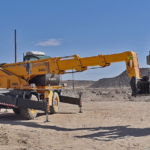Energy News Beat
The nonprofit Global Witness investigated lithium mining projects in Zimbabwe, the Democratic Republic of Congo, and Namibia, which appear to reproduce the same model of extractivism that has impoverished African countries for centuries.
In March, residents of the Namibian town of Uis took to the streets to protest the activities of Chinese miner Xinfeng, alleging the company was carrying out large-scale industrial mining without the proper permits or social license.
In Zimbabwe, activist Farai Maguwu from the Centre for Natural Resource Governance described a similar experience of exclusion and exploitation at Chinese miner Sinomine’s Bikita lithium operation, calling it “typical extractivism.”
One of the ways to prevent exploitation is to shut out companies that “socialize the costs and privatize the profits,” Maguwu said, adding he remains hopeful that encouraging competition between companies from across the world is the way to ensure better outcomes for Zimbabweans.
A recent report from U.K.- and U.S.-based nonprofit Global Witness captures the details of how a new mining rush driven by demand for “clean energy” minerals can go wrong, reproducing the same model of extractivism that has impoverished African countries for centuries.
“Sheer mineral wealth hasn’t always translated into development, particularly for the communities who live next to mines,” said report author Colin Robertson, a senior investigator at Global Witness.
The team investigated mining projects for lithium, an essential mineral in the production of batteries for electric vehicles and power storage, in Zimbabwe, the Democratic Republic of Congo, and Namibia. They highlighted the risk that future mining will “embed corruption, fail to develop local economies, and harm citizens and the environment.”
In January this year, residents living near Uis in western Namibia started noticing a daily convoy of trucks leaving an area they believed to simply be an artisanal mining site. The large vehicles were passing through the community on their way to the port of Walvis Bay on the country’s western shore, according to Jimmy Areseb, a community activist. In reality, the trucks were exporting minerals from an extensive operation residents knew little about. In March, people took to the streets to protest the activities of Chinese miner Xinfeng Investments, the owner of the trucks and entity extracting resources, alleging the company was carrying out large-scale industrial mining without the proper permits or social license.
A demonstration against lithium mining by Xinfeng in Uis in March this year. Image courtesy Jimmy Areseb.
Uis sits at the heart of an area of immense cultural, ecological and economic significance. The mining site falls within the expansive Tsiseb Conservancy, which supports residents through legal wildlife hunting. Ancient rock art believed to be thousands of years old lies a few kilometers from the town of Uis. These rocky outcrops also hold pegmatites, igneous rocks traditionally mined for tin, and, more recently, lithium.
In a petition, some community leaders, including Areseb, alleged that the company didn’t properly consult with community members when it appeared on the scene last year, adding that leaders of the operation bought off local chiefs to obtain permissions for their mining project. Areseb accused the government of “total negligence,” overlooking the interest of ordinary citizens in granting approvals.
Rather than bringing tangible benefits, the mining activity interferes with the breeding of wildlife like springbok, hyenas and rhinos that bring in revenue for the conservancy, he said, adding that they’re scared away by the noise from the mining operation.
“We’re not saying the company must go,” he said, adding the community just wants a seat at the table so that “we can discuss the way forward.”
According to documents reviewed by Mongabay, a Namibian company, Long Fire Investments, owned by businessman January S. Likulano, bought 10 mining claims for around $160 in total to carry out small-scale mining in the region. Only Namibian citizens can apply for small-scale mining permits, which are much cheaper than industrial mining permits issued to foreign companies. The Global Witness report cited ties between Long Fire Investments and Tangshan Xinfeng HongKong Ltd., owner of Xinfeng Investments, as evidence that the Namibian company was a front for Tangshan Xinfeng.
In an export application, Long Fire Investments requested permission to export 55,000 metric tons of lithium-rich ore valued at $32 million to Tangshan Xinfeng. Such a relationship allows the Chinese company to profit from a major lithium deposit for a pittance of its actual value while dodging the need for a proper environmental impact assessment for industrial mining by operating under small-scale mining permits.
“A company is exporting minerals worth millions. The royalty fee they pay our government is only 2%,” 28-year-old Areseb said. “We cannot allow this while the hospitals are falling apart, schools are falling apart, the roads, everything in our country is debilitated.”
Uis sits at the heart of an area of immense cultural, ecological and economic significance. Image by jbdodane via Flickr (CC BY-NC 2.0).
An assessment of Namibia’s mining code found that fiscal requirements for foreign companies, including the royalty rate of 2% for industrial mining of minerals, were hurting the government. The policy translates into low upfront revenue for the state, and isn’t designed to bring proportional benefits when the price of minerals like lithium increases on the global market, according to the assessment. Battery-grade lithium carbonate sold at $37,000 per metric ton in 2022 compared to around $6,000 per metric ton in 2012, while the royalty rate has remained unchanged since 2009. Thus, the status quo boosts miners’ profits.
Local communities and Namibian parliamentarians have also accused the company of housing workers in “apartheid conditions” while failing to deliver on promises to build processing facilities within Namibia.
In November, Xinfeng announced that it plans to launch a lithium-processing plant in Namibia in the first quarter of 2024. In an email to Mongabay, a Xinfeng representative declined to comment on the allegations or share documents proving the operation’s legitimacy. Likulano also didn’t respond to a request for comment.
In Zimbabwe, another activist, Farai Maguwu, director of the Centre for Natural Resource Governance, described a similar experience of exclusion and exploitation at the Bikita mine, calling it “typical extractivism.” In January 2022, Sinomine, a Chinese company, purchased Bikita Minerals, which operates the largest lithium mine in the Southern African nation. Following the takeover, its new owners ramped up production from 3,000 to around 10,000 metric tons a month, primarily for export to China and Japan, according to a report in the Reuters.
“The communities watch mineral-laden trucks leaving every day, yet there is no investment in public goods, in health, education, or supporting alternative livelihoods,” Maguwu said. “[The company] are here only to loot. There is no connection with the priorities of the communities they operate in.”
In 2023, following media reports, the Zimbabwean government briefly shut down the mine, citing exploitative labor conditions.
Foreign mining companies aren’t the only ones exploiting the country’s natural resources; “sanctioned local elites” are also profiting, with the complicity of the state at the expense of citizens, according to Global Witness. In Zimbabwe’s Sandawana mine, more than a decade after production of emeralds ceased, a newly coveted mineral was discovered: lithium. Artisanal miners were the first to seize the opportunity, but the Zimbabwe Miners Federation (ZMF) soon obtained a lease for the mine.
It was set up to allow artisanal miners, who tend to be materially poor, to formally participate in and benefit from the mineral rush. ZMF’s president, Henrietta Rushwaya, is an associate of Zimbabwe’s president, Emmerson Mnangagwa, sharing ties of traditional kinship. An Al Jazeera investigation had previously linked Rushwaya with corruption and money laundering in the gold mining sector. She was convicted and fined for gold smuggling this November. The report cited the involvement of players like Rushwaya as red flags for persistent corruption in the sector.
Political elites swooping in to take advantage of lucrative opportunities is nothing new. The Global Witness report alleges the incident in Zimbabwe came at the cost of the artisanal miners, who pay to be part of the ZMF even though the body doesn’t appear to promote the interests of small miners. They’re paid lower prices for mined ore than before, even as the ZMF strikes profitable deals to export lithium. The federation didn’t respond to Mongabay’s requests for comment.
“Where the nation must benefit, it’s the leaders who are benefiting,” Maguwu said. “It’s daylight robbery of the people of Zimbabwe.” Not only do corrupt leaders corner profits from the trade, they also fail to promote sustainable development that would benefit a broader section of the populace, he said.
A lithium mining operation in Uis. Image by Luccornish via Wikimedia Commons (CC BY-SA 4.0).
One of the ways to prevent exploitation is to shut out companies that “socialize the costs and privatize the profits,” Maguwu said. He described a situation where companies consume community water resources and pollute common water bodies during mining. The costs of these actions are borne by the communities at large, but when it comes to the profits from mineral exploitation, the companies are mainly concerned about compensating their shareholders.
“Currently, there is no competition, so the Chinese just do as they please because they are in bed with the ruling elites,” Maguwu said.
The Business & Human Rights Resource Centre notes that allegation of human rights violations, environmental harms, and labor abuses are as much present in mining operations linked to Canadian, U.S., U.K., Australian and European companies and investors as Chinese companies.
And, in some cases, competition between corporations can prove detrimental, with protracted battles paralyzing projects. In the DRC, two foreign companies are vying for control of the vast Manono lithium deposit, which could become Africa’s largest lithium mine. The project has been mired in corruption allegations and legal challenges for more than five years now. Australian company AVZ Minerals and Chinese mining behemoth Zijin Mining Group Ltd. are both vying for control of the concession, with a state-owned mining entity, Cominière, involved in alleged suspect dealings with both.
Though the Manono mine has yet to produce any lithium ore, the Global Witness report says the project may have generated about $28 million for shell companies incorporated in tax havens, windfall gains made through sales of mineral rights acquired below market price from government-controlled Cominière. Little of that money has reached either DRC government coffers or the communities living near the deposit.
AVZ did not respond to Mongabay’s requests for comment, while Zijin Mining denied allegations that it was involved in corrupt dealings with respect to the Manono project.
Despite being aware of the fraught nature of this 21st-century mineral rush, Maguwu said he remained hopeful that encouraging competition between companies worldwide is the way to ensure better outcomes for Zimbabweans through competition over favorable contracts and standards benefiting the country, with some businesses emerging as models for others.
No matter the ownership of the companies, what both Areseb and Maguwu said would benefit their countries was domestic value addition. Zimbabwe, Namibia and other countries have banned the export of unprocessed lithium, but it remains to be seen whether this leads to the development of domestic processing facilities and related economic benefits for local communities in these producer nations.
In one encouraging sign, Zimbabwe’s mining minister said the country’s earnings from lithium exports shot up from $70 million in the first nine months of 2022 to $209 million in the same period this year. The ban on exports of unprocessed lithium came into force in December 2022. However, export earnings accrue to companies. As long as beneficial ownership remains in the hands of foreign entities, it isn’t clear how much increased export earnings will boost domestic revenues or the lives of ordinary Zimbabweans.
“There’s an increased awareness that African countries have to take a larger share of the value chain as part of a just transition,” Robertson said. “But there’s a big risk that we’ll see more of the same pattern unless real efforts are made to do things differently during this new boom.”
ENB Top News
ENB
Energy Dashboard
ENB Podcast
ENB Substack
The post Report: Rush for ‘clean energy’ minerals in Africa risks repeating harmful extractivist model appeared first on Energy News Beat.








